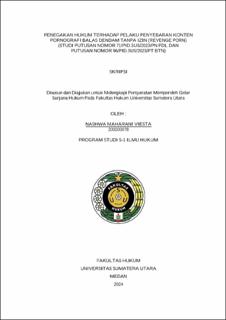| dc.contributor.advisor | Yunara, Edi | |
| dc.contributor.advisor | Trisna, Wessy | |
| dc.contributor.author | Viesta, Nashwa Maharani | |
| dc.date.accessioned | 2024-12-10T04:17:27Z | |
| dc.date.available | 2024-12-10T04:17:27Z | |
| dc.date.issued | 2024 | |
| dc.identifier.uri | https://repositori.usu.ac.id/handle/123456789/99284 | |
| dc.description.abstract | Crime can happen anywhere and anytime, at this time, the sophistication of technology can influence someone to commit crimes indirectly, namely through the internet or cybercrime. One of the cybercrimes in question is revenge porn. Revenge porn itself refers to the distribution of intimate photos or videos of someone without permission, usually with the intention of damaging the image or embarrassing the person. This action is often carried out by ex-partners or individuals who have access to the content. In addition to violating privacy, revenge porn can have a very detrimental impact on the mental and emotional health of the victim. The problem that will be answered in this study is to find out how law enforcement is in providing law for the perpetrators. In Indonesia itself, there is no law that explains revenge porn so it must be qualified based on the law that is close in order to find out whether or not the judge's considerations are appropriate in passing decision number 71 / Pid.Sus / 2023 / PN Pdl and decision number 96 / Pid.Sus / 2023 / PT BTN. The type of research in this thesis uses This research is a normative legal research that uses a normative legal approach. This method refers to legal norms and is carried out through literature studies to collect secondary data that includes primary, secondary, and tertiary legal materials that are relevant to the problem being studied. Data analysis was carried out using a qualitative method, where conclusions and suggestions were drawn using deductive data analysis. The results of the study show that revenge porn can be qualified as an immoral crime contained in the Criminal Code, the Pornography Law and the Information and Electronics Law. Law enforcement on revenge porn itself is still not optimal because there is no definite law that regulates it like abroad. The judge's consideration in issuing verdict number 96 / Pid.Sus / 2023 / PT BTN by eliminating additional criminal penalties imposed on the panel of judges in verdict number 71 / Pid.Sus / 2023 / PN Pdl is not appropriate, because there are several legal facts that are revealed. | en_US |
| dc.language.iso | id | en_US |
| dc.publisher | Universitas Sumatera Utara | en_US |
| dc.subject | Law Enforcement | en_US |
| dc.subject | Pornography | en_US |
| dc.subject | (Revenge Porn) | en_US |
| dc.title | Penegakan Hukum terhadap Pelaku Penyebaran Konten Pornografi Balas Dendam Tanpa Izin (Revenge Porn) (Studi Putusan Nomor 71/PID.SUS/2023/PN PDL dan Putusan Nomor 96/PID.SUS/2023/PT BTN) | en_US |
| dc.title.alternative | Law Enforcement Against The Perpetrators of The Spread of Pornographic Content Revenge Without Permission (Revenge Porn) (Revenge Porn Study of Decision Number 71/PID.SUS/2023/PN PDL and Judgement Number 96/PID.SUS/2023/PT BTN | en_US |
| dc.type | Thesis | en_US |
| dc.identifier.nim | NIM200200078 | |
| dc.identifier.nidn | NIDN0022126005 | |
| dc.identifier.nidn | NIDN0123018601 | |
| dc.identifier.kodeprodi | KODEPRODI74201#Ilmu Hukum | |
| dc.description.pages | 118 Pages | en_US |
| dc.description.type | Skripsi Sarjana | en_US |
| dc.subject.sdgs | SDGs 16. Peace, Justice And Strong Institutions | en_US |


